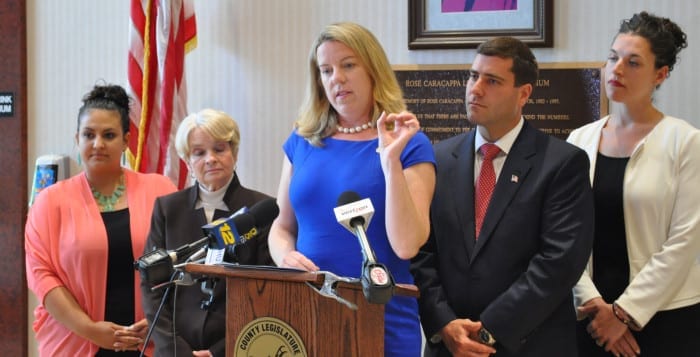Suffolk County strengthens domestic violence safeguards

The county’s proactive push to empower victims of domestic violence reached another milestone on Tuesday when the Legislature unanimously approved a pilot program that would slap ankle bracelets on offenders under an order of protection.
County Legislator Kara Hahn (D-Setauket) ignited the domestic violence discussion last month when the county approved her legislation providing law enforcement and victims with danger assessment tools that identify high-risk offenders. Her efforts turned another corner with Tuesday’s approval of legislation that she called a multi-faceted approach to making Suffolk’s domestic violence policy stronger than it’s ever been.
The latest pieces of legislation make Global Positioning System technology available to electronically monitor those in the family and criminal court systems who are subject to a “stay away” order of protection — which is more restrictive than a “refrain from” order — and pose a continuing threat to the safety of a victim or their children, Hahn said.
“This has been something I’ve wanted to work on since getting here,” said Hahn, whose personal experience as a victim of domestic violence brings the issue to the top of her list of priorities. “One of the things that was important to me was dealing with orders of protection. I had an order of protection and it’s very frightening — and I’ve heard over and over again over the years — that it’s just a piece of paper with no ability to truly protect the victim. That’s what I’m trying to fix.”
Both bills were virtually replicas of one another, but were specific to criminal and family courts respectively.
The county’s district attorney would acquire the GPS units and the offenders would have to cover the cost of monitoring, she said.
Tom Spota, the Suffolk County district attorney, threw his support behind Hahn’s initiative.
“I have every confidence this pilot program will be successful in effectively protecting victims of domestic violence,” he said in a statement.
In 2013 alone, the state division of criminal justice reported that there were more than 1,500 violations of orders of protection in the county. That statistic, coupled with the fact that domestic violence accounted for 21 percent of all violent victimizations nationwide from 2003 to 2012, was what spurred Hahn to bulk up her agenda, she said.
“In my experience as a federal prosecutor, GPS devices serve as a real deterrent,” said Tim Sini, assistant deputy Suffolk County executive. “In the moment of passion, an offender often thinks twice before reoffending when he knows he is being monitored by law enforcement.”
The pilot program would provide the county with 30 new GPS devices to be used when judges assign offenders to an order of protection. The technology could be used in one of two ways — either tracking offenders so they stay away from victims’ homes or jobs, or acting as proximity detectors and letting victims know if an offender is near them. The latter form of tracking would be optional for victims.
“Having been someone who had an order of protection and was afraid that the offender would come, it gives you peace of mind as a victim knowing you could be alerted,” Hahn said. “If a victim doesn’t like it, they don’t have to [wear] it.”






